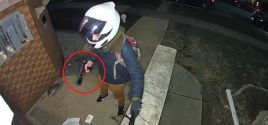Prosecutors seek OK to create phony filesProsecutors are urging a change in state law to allow them to falsify court records in some cases.By DAN CHRISTENSEN AND PATRICK DANNER Miami Herald Feb. 23, 2007 |
Popular 
Putin Accuses 'Ethnic Jews' of Tearing Russian Orthodox Church Apart

Ohio Senate Passes Bill Aimed at Outlawing Criticism of Israel, Criminalizing Gospel

IDF Opens Fire on Syrians Protesting Israel's Expanding Occupation of South Syria

Saudi National Rams Car Into Germans at Christmas Market in Suspected Terrorist Attack [UPDATED 2X]

Nick Fuentes Targeted by Gunman at His Home After Being Doxed on Elon Musk's Twitter [UPDATED]
 Florida's prosecutors are floating a proposal to the Legislature to give them the power to secretly falsify public court records -- with a judge's approval -- for undercover law enforcement purposes. Spurred by Miami-Dade State Attorney Katherine Fernandez Rundle, the draft bill would limit the authority to manufacture and plant fake documents in court files to 180 days. But it also provides for an unlimited number of 30-day extensions. ''Judges would be very involved in the monitoring. It all has to go through a judge,'' said Arthur I. ''Buddy'' Jacobs, general counsel for the Florida Prosecuting Attorneys Association, which supports the bill. The American Civil Liberties Union of Florida opposes the idea. ''The fundamental problem is that it so goes against our notion of the way our justice system ought to work,'' said ACLU legislative director Randall Marshall. ``How would we ever be able to trust anything in the judicial record knowing that something could be intentionally falsified with a judicial seal of approval?'' Tallahassee Public Defender Nancy Daniels said the proposal undermines constitutional protections for those charged with crimes. ''Even if this is temporary, what if someone testifies during that time and we never get to know they had a criminal conviction? We can't properly cross-examine to develop their motives for giving testimony,'' Daniels said. The bill has been prefiled with the Florida Senate for the legislative session that begins March 6. A second, longer version of the bill has been prefiled with the House. It would convey authority to falsify any public record to prosecutors, judges, mayors, sheriffs, coroners and other public officers unless they were acting corruptly. The Miami Herald reported late last year how judges and prosecutors in Miami-Dade had official court records altered and kept secret dockets to disguise what was happening in some court cases. Two cases were uncovered in which court dockets were altered to cover up the felony convictions of informants, but more are known to exist. Chief Assistant State Attorney Jose Arrojo said authorities have altered the public records of informants for two decades. It is a crime for anyone in Florida, including judges and prosecutors, to alter or falsify court records or proceedings. Violators can be sent to prison for a year. STATE INQUIRY The prosecutors' push to change Florida criminal statute 839.13 comes amid a statewide inquiry by Supreme Court Chief Justice R. Fred Lewis into the improper hiding of court records. The probe began last summer after The Miami Herald reported that hundreds of civil and criminal cases, mostly in Broward County, were kept hidden on secret dockets. More recently, Lewis asked the Florida Bar to examine the propriety of falsifying court records and to recommend rule changes by March 1. The high court is scheduled to hear oral arguments on secret and false dockets March 5. Rundle sent a letter to the chief justice in December defending the practice of altering public court records as occasionally necessary to protect informants and investigations. She also announced that Miami-Dade judges and prosecutors would no longer ''affirmatively'' falsify dockets. In response, the Florida Public Defenders Association has asked that the practice be banned. Ed Griffith, a spokesman for the Miami-Dade State Attorney's Office, said the bill is a priority for the prosecutors' association, but declined to comment further. The Senate sponsor is Dave Aronberg, D-Greenacres, vice chairman of the criminal justice committee. The House sponsor is Rep. Julio Robaina, R-South Miami. ''Ultimately, this protects the public against the evil of corruption,'' Aronberg said. ``It's just another tool. How else can you get at a corrupt judge unless you create false pleadings?'' TWO SCENARIOS In an e-mail to Aronberg's office, Ted Mannelli, executive director to the state attorney, wrote that prosecutors have used the technique in ``two scenarios.'' ''In a very, very, very limited number of cases, perhaps less than five over the last two and one half decades in our circuit, bogus court records have been generated in corruption investigations targeting judges,'' Mannelli wrote. The other scenario Mannelli described involves any case in which defendants plead guilty and sentencing is deferred to let informants work undercover. Mannelli did not say how many times that has happened. He wrote in the e-mail and confirmed in a phone interview that prosecutors believe Florida's prohibition on altering court records doesn't apply to them because they have acted ``without corrupt intent.'' The law, however, makes no such distinction. The Florida Supreme Court also has ruled that a lack of corrupt intent does not excuse the faking of court records. 1997 CASE Broward County Judge Laran Johnson backdated records in an apparent attempt to keep her caseload low. In 1997, the court removed her from office because ``her knowing and repeated acts of falsifying public records strike at the very heart of judicial integrity.'' Today, prosecutors want the law changed to make sure ''these procedures are clearly legal and allow for their continuation,'' Mannelli said in the email. |



